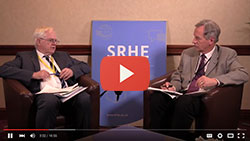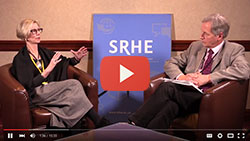Keynote Speakers
Speakers
![]() Simon Marginson
Simon Marginson
![]() Susan Robertson
Susan Robertson
Simon Marginson
 |
Simon Marginson Professor of International Higher Education, UCL Institute of Education, University College London |
Keynote Address |
Interview |
 |
 |
High Participation higher education: Global and National Contradictions
KEYNOTE ABSTRACT
Human capital theory assumes that education determines the marginal productivity of labour, and marginal productivity determines earnings. It is the dominant reading of relations between higher education and work. Assumptions that intellectual formation constitutes a mode of economic capital, and higher education is essentially preparation for work and careers, are commonplace. It is widely believed that higher education determines the position of graduates, rather than their social backgrounds, the demand for labour, or economic policy, suggesting remarkable optimism about the potency of higher education. This underpins the assumption that the quality and efficiency of higher education, and individual institutions, can be reversed engineered using comparative measures of graduate employability based on salaries or employment rates. However, the intellectual foundations of human capital theory (and hence comparative measures of employability) are fatally flawed. Human capital theory fails the test of realism because of weaknesses in its meta-method: theorisation using a single lens, closed system modeling of social relations, the application of mathematical tools to inappropriate materials, and the multivariate analysis of interdependent variables. These weaknesses lead to numerous lacunae. For example, human capital theory cannot explain status objectives, which are more important for some graduates, and in some countries, than others; or how education augments productivity; or why top-end salary inequality has increased dramatically in some countries. Unfortunately, the dominance of human capital theory and its narrative about the effects of higher education has blocked the development of more realistic and nuanced research and policy in relation to the interface between higher education and work. The limitations of human capital theory are discussed with reference to research on social stratification, work, earnings and education.
THINKPIECE
High participation higher education is in the process of becoming near-universal. In the next generation it is likely that at world level more than 50 per cent of all the school leaver age cohort will enter tertiary education, with more than a third taking qualifications into the labour markets. Yet the modern social inclusion brought about by growth in educational participation is not enough in itself to provide for democratic societies and the fuller development of human capacity and potentials. Higher education systems vary greatly in the quality of their mass institutions, the social composition of their elite HEIs, and the degree of social mobility associated with higher education. What matters is the capacity of a high participation system (HPS) of higher education to provide a broad pathway for social mobility, so that students/graduates’ opportunities and trajectories are not determined by their social backgrounds. We can call this capacity of higher education to make a difference to the social mix, ‘the allocative social power of higher education’.
Six conditions strengthen this allocative social power of an HPS. It must be said that these conditions absorb state resources and rest on a viable tax system. Not all countries can achieve them all tomorrow; and some wealthy countries do not achieve them all today. (1) Funding is largely from public sources, so that families cannot invest privately to secure an advantage, or if tuition fees are charged, income contingent loans rather than direct fees are used, repayment thresholds and conditions are generous, and there is extra support for under-participating social groups. (2) Private sector provision is closely regulated to ensure social inclusion and quality of learning. (3) Institutional stratification is modest. Research and professional training functions are broadly distributed. ‘World-Class University’ (WCU) development may be necessary to strengthen national science and elevate university prestige but WCUs are coupled with policies that ensure the second tier of higher education is strong and mass higher education is healthy. (4) The state and society value rigorous learning, and academic professionals are strong enough to maintain solid standards in teaching and assessment, and this is not undermined by a consumerist focus on student satisfaction rather than learning. (5) Autonomous institutions, and their processes of assessment and student selection, are free from manipulation by powerful families (either directly or via the state) who seek competitive advantage. This maximises the opportunity for low SES students to move up through their own efforts. (6) The scope of social regulation is extended to improve equity in graduate labour market selection.
However, the old hubris that higher education alone can create broad-based mobility and just societies should be put aside. More equal educational outcomes or greater mobility are hard to achieve in highly unequal societies, in which educational and social stratification seem to lock together. Higher education is not the only driver of social mobility. It is necessary but not sufficient, one part of a chain of institutional effects. Thus there is a seventh condition for a strong allocative social power of higher education: (7) There is a deep-seated and widespread social consensus of support for universal high quality in education, social equality, and mobility on the basis of merit.
The question is, what are the levers that can advance us towards a fairer society and a more meritocratic higher education system? Are any of those levers in higher education, or must we wait for a sea-change in the polity and for the top 0.1% to begin to let go of the economy? And are we confined to a national strategy alone, or are there cross-border levers? Can we work with colleagues abroad to build more equal high quality higher education systems?
Biographical Note
Simon Marginson directs the ESRC/HEFCE Centre for Global Higher Education, a partnership of three UKHEIs and eight offshore HEIs, entailing 13 research projects, that will open in October this year. Simon is also Professor of International Higher Education at the UCL Institute of Education, University College London, and the Joint Editor-in-Chief of the journal Higher Education. Between 2006-2013 he was Professor of Higher Education at the University of Melbourne in Australia. For the last 15 years his main inquiry has been a critical realist theorisation of higher education and globalisation, including the potentials and limits of national policy and cross-border activity. Current research projects include work on higher education, stratification and inequality in the context of high participation systems; a comparative study of the public good role of HEIs in contrasting political cultures; and higher education and science in East Asia. Simon became an Honorary Fellow of SRHE at Bristol in 2005, and was the 2014 Clark Kerr Lecturer on Higher Education at the University of California Berkeley.
Susan Robertson
 |
Susan Robertson Professor of Education (Sociology), University of Bristol |
Keynote Address |
Interview |
 |
 |
Higher Education: A Solution to, or Problem in, Rising Social Inequalities?
When Thomas Piketty’s book on Capital in the 21st Century was released in 2014, it became a remarkable overnight success and best seller in that it Piketty focused attention not only on the concentration of enormous wealth in a tiny social elite in countries such as the UK and the USA, but showed that their wealth had increased following the financial crisis in 2008. Yet what was particularly striking about one of Piketty’s solutions was his argument for more emphasis on education and skills delivered through institutions of higher education.
In this keynote address I show that Piketty’s arguments are based on an increasingly problematic assumption; that higher education sits outside of, rather than being part of, the dynamics that have given rise to rising inequalities. In this keynote address I argue there are major problems with this proposed solution.
To begin, Piketty views education as human capital, rather than seeing education as being a key social institution involved in both the production and social reproduction of capitalist societies. It is thus a key institution in producing social relations, including class, race and gender, which in turn mediate ongoing income and wealth inequalities.
Second, Piketty’s dependence on comparing national statistics results in a methodological nationalist lens. Yet, as researchers increasingly show, argued elsewhere, looking at the world through a methodological nationalist lens is problematic. Over the past three decades, production and labour markets have become increasingly globalised, with important outcomes for the relationship between skill and wages in developed economies like the USA and UK.
Finally, Piketty underestimates the extent to which education itself in countries like the UK and USA has produced greater inequalities as a result of transformations in how the sector is governed, and the individual and social outcomes that have resulted.
The transformations can be linked to the income and wealth dynamics that Piketty is documenting; declining tax receipts to the state has resulted in limiting its capacity to redistribute and created a greater burden on households; education itself is a new frontier for commodification both for the state and entrepreneurs bringing it directly into the sphere of production, profit making and wealth generation; the corporate elite have used their wealth to fund foundations which in turn promote education policies and fund programmes fostering social norms, such as individualism, entrepreneurialism, and a “winner takes all” competition mentality, all the while displacing state responsibility and accountability for education delivery.
This combination of lacunae for Piketty leads to an intellectual cul-de-sac, and results in a missed opportunity to reveal the complex dynamics at work in producing income inequality, particularly since the 1980s transforming society’s education sectors and wider social outcomes. In my conclusion I advance three major challenges that we might consider to reverse the direction of travel around social inequalities and the role that a very different higher education might play in that.
Biographical Note
Susan Robertson is Professor of Sociology of Education, at the University of Bristol, UK. Prior to this, she held appointments in New Zealand and Australia. She has a long standing research interest in transformations in the wider global economy and society, and the role of education in this. Susan is founding Director of the Centre for Globalisation, Education & Social Futures (established in 2003), and founding co-editor (with Roger Dale) of the Routledge journal – Globalisation, Societies and Education. Her ongoing theoretical engagements include spatializing the sociology of education, critical cultural political economy of education and variegated regionalisms. Her recent books include: Public Private Partnerships in Education with Karen Mundy, Anthony Verger and Francine Menashy (published by Edward Elgar), and Privatisation, Education and Social Justice with Ian Macpherson and Geoffrey Walford (published by Symposium Books). Susan has been active in raising social justice questions around the nature of education governance, and has worked closely with activist groups, unions and foundations around the world to encourage a global debate around ensuring a fairer, more equitable society.

the global higher education research community…






